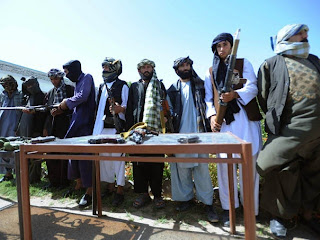The Pakistani Taliban is in peace talks with the Pakistani government, a senior commander in the militant group said Saturday. He said negotiations were "progressing well" and could soon end in a formal agreement.
The statement by Maulvi Faqir Mohammad is the first time a named Taliban commander has confirmed that the group is negotiating with the Pakistani government. But it is unclear whether he speaks for entirety of the network, which is believed to have splintered into different factions over the last year.
Mohammad, said to be the deputy chief of the Pakistani Taliban, said his men had held "peace talks with relevant government officials."
They are progressing well, and we may soon sign a formal peace agreement with the government," he said in a telephone conversation.
Government officials were not available for comment. They have previously denied earlier reports of talks.
Despite pushing for peace talks to end a related insurgency in Afghanistan, Washington is unlikely to support similar efforts to strike a deal in Pakistan.
U.S. forces and their NATO and Afghan allies regularly come under attack from Afghan militants and al-Qaida operatives, who live alongside Pakistani Taliban militants in the border region.
Previous peace deals there didn't last long, and gave militants time to rest and regroup.
Mohammad's main area of strength is the Bajur tribal region, which has seen military operations over the past three years that army commanders have claimed wiped out militancy there. He said any deal in Bajur could be "role model" for the rest of the border region.
The Pakistani Taliban, allied with al-Qaida and based in the northwest close to the Afghan border, have been behind much of the violence tearing apart Pakistan over the last 4 1/2 years. At least 35,000 people have been killed in guerrilla attacks and army offensives.
Last month, anonymous militants and intelligence officials said exploratory peace talks were under way between the two sides. The government and the army denied any such talks after those reports were published, as did a spokesman for the Taliban.
The Taliban say they want to oust the U.S.-backed government and install a hardline Islamist regime. They also have international ambitions and trained the Pakistani-American who tried to detonate a car bomb in New York City's Times Square in 2010.
Yet many commanders grouped under its name are motivated by building criminal fiefdoms at a local level. Smuggling, drugs and kidnaps-for-ramsom are very lucrative business in the lawless, tribally administered region.
Despite the Taliban's violence, there is political and public support for a peace deal with the group.
In September, the weak civilian government announced it was prepared to "give peace a chance" with militants, pandering to right-wing Islamist parties and their supporters.
Many Pakistanis share the hardline religious views and anti-American stance of the Pakistani Taliban.
They apparently believe the militants could be brought into the fold if only Islamabad severed its alliance with Washington, which they blame for sparking the insurgency by invading Afghanistan following the Sept. 11, 2001 attacks in the United States.
The statement by Maulvi Faqir Mohammad is the first time a named Taliban commander has confirmed that the group is negotiating with the Pakistani government. But it is unclear whether he speaks for entirety of the network, which is believed to have splintered into different factions over the last year.
Mohammad, said to be the deputy chief of the Pakistani Taliban, said his men had held "peace talks with relevant government officials."
They are progressing well, and we may soon sign a formal peace agreement with the government," he said in a telephone conversation.
Government officials were not available for comment. They have previously denied earlier reports of talks.
Despite pushing for peace talks to end a related insurgency in Afghanistan, Washington is unlikely to support similar efforts to strike a deal in Pakistan.
U.S. forces and their NATO and Afghan allies regularly come under attack from Afghan militants and al-Qaida operatives, who live alongside Pakistani Taliban militants in the border region.
Previous peace deals there didn't last long, and gave militants time to rest and regroup.
Mohammad's main area of strength is the Bajur tribal region, which has seen military operations over the past three years that army commanders have claimed wiped out militancy there. He said any deal in Bajur could be "role model" for the rest of the border region.
The Pakistani Taliban, allied with al-Qaida and based in the northwest close to the Afghan border, have been behind much of the violence tearing apart Pakistan over the last 4 1/2 years. At least 35,000 people have been killed in guerrilla attacks and army offensives.
Last month, anonymous militants and intelligence officials said exploratory peace talks were under way between the two sides. The government and the army denied any such talks after those reports were published, as did a spokesman for the Taliban.
The Taliban say they want to oust the U.S.-backed government and install a hardline Islamist regime. They also have international ambitions and trained the Pakistani-American who tried to detonate a car bomb in New York City's Times Square in 2010.
Yet many commanders grouped under its name are motivated by building criminal fiefdoms at a local level. Smuggling, drugs and kidnaps-for-ramsom are very lucrative business in the lawless, tribally administered region.
Despite the Taliban's violence, there is political and public support for a peace deal with the group.
In September, the weak civilian government announced it was prepared to "give peace a chance" with militants, pandering to right-wing Islamist parties and their supporters.
Many Pakistanis share the hardline religious views and anti-American stance of the Pakistani Taliban.
They apparently believe the militants could be brought into the fold if only Islamabad severed its alliance with Washington, which they blame for sparking the insurgency by invading Afghanistan following the Sept. 11, 2001 attacks in the United States.





0 comments:
Post a Comment